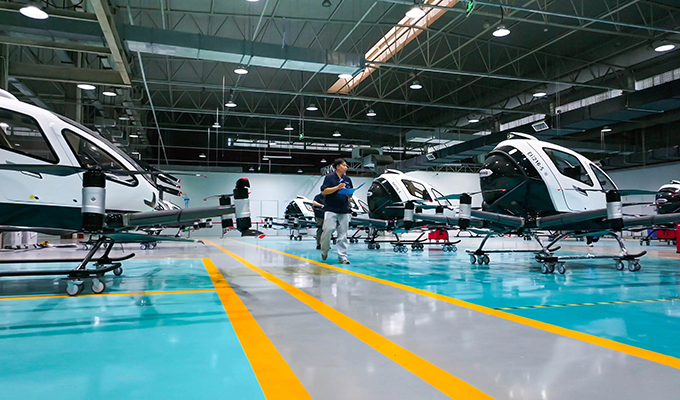EHang Holdings Limited (Nasdaq: EH), a global pioneer in autonomous aerial vehicle (AAV) technology, has announced a groundbreaking partnership with Wencheng County in Zhejiang Province, China. This collaboration marks a significant milestone in developing China's low-altitude economy and urban air mobility (UAM) sector. With this agreement, Wencheng County joins other pioneering regions in China, such as Guangdong province and Beijing, in embracing eVTOL technology. Together, these forward-thinking initiatives are positioning China at the forefront of eVTOL technology adoption and implementation.
eVTOL News | Electric Aircraft News | Advanced Air Mobility News
News
Archer Aviation, a leading electric vertical takeoff and landing (eVTOL) aircraft developer, has unveiled ambitious plans to create an air mobility network in the San Francisco Bay Area. This network aims to transform regional transportation by connecting five key locations: South San Francisco, Napa, San Jose, Oakland, and Livermore.
Beijing has recently announced a comprehensive three-year plan to develop a network of low-altitude air routes for electric vertical takeoff and landing (eVTOL) vehicles by 2027. The Beijing Action Plan (2024-2027) is designed to advance the development of the low-altitude economy industry, aiming to improve urban air mobility, shorten commuting durations, lessen traffic congestion, and strengthen the city's low-altitude economic sector.
Urban Air Mobility (UAM) and Advanced Air Mobility (AAM) are related but distinct concepts in the evolving landscape of aerial transportation. While both aim to revolutionize how we move people and goods, they differ significantly in their scope and mission. Here's a detailed look at the differences between them:
Wisk Aero, a leading Advanced Air Mobility (AAM) company and Houston Airports have signed a Memorandum of Understanding (MOU) to introduce autonomous air taxis to Greater Houston. This strategic collaboration aims to revolutionize urban mobility by identifying potential vertiport sites, developing necessary infrastructure and routes, and engaging with the community to bring this innovative and sustainable form of transportation to the region.
The Civil Aviation Administration of China (CAAC) has officially approved AutoFlight's application for a Type Certificate (TC) for its Prosperity eVTOL aircraft, a 5-seater designed for vertical take-offs and landings. This approval follows closely on the heels of the TC granted to AutoFlight's CarryAll cargo eVTOL, marking another significant milestone as it was the first ton-level eVTOL aircraft to receive such certification globally.
Electric vertical takeoff and landing (eVTOL) aircraft are set to revolutionize the tourism industry by offering more efficient, environmentally friendly, and cost-effective options for sightseeing flights compared to traditional helicopters and fixed-wing aircraft.
- Related articles::
ELECTRON Aerospace, an electric aircraft developer based in the Netherlands, has signed up two new customers for its future battery-powered aircraft.
Air2E and Hopscotch Air, two air taxi operators based, respectively, in Berlin, Germany, and Farmingdale, New York, have placed orders for the Electron 5 aircraft. The aircraft is still under development and not expected to enter service until nearer 2028. With these two deals, the exact breakdown of which hasn’t yet been made public, ELECTRON Aerospace has already accumulated orders worth almost €200 million. This includes previous orders placed by Australian electric aircraft operator FlyOnE and Mint Air, a Korean startup.
The advent of electric vertical takeoff and landing (eVTOL) aircraft has brought urban air mobility closer to reality. As manufacturers develop innovative designs, aviation authorities worldwide are establishing certification criteria to ensure the safety and airworthiness of these novel aircraft. The Federal Aviation Administration (FAA) and the European Union Aviation Safety Agency (EASA) have recently unveiled new certification standards for eVTOLs, aiming to harmonize requirements and streamline the approval process. However, notable differences exist between their approaches, while China's Civil Aviation Administration (CAAC) has taken a more accelerated path to certification.
In a world increasingly driven by the quest for sustainable and efficient urban transport solutions, Honda is setting the pace with its latest venture into the electric vertical take-off and landing (eVTOL) market. With a legacy that spans both the highways and the skies, Honda is harnessing its storied history of innovation to craft an eVTOL aircraft that promises to redefine the urban air mobility landscape.
- Vertical Flight Decoded: The difference Between Helicopters, eVTOL, eSTOL, and eCTOL Aircraft
- Eve Air Mobility Presents Vector. Urban ATM Solution.
- EHang’s EH216-S Pilotless eVTOL Successfully Completed Its Debut Flight in Latin America.
- Embraer and Dassault Systèmes to support quieter eVTOL aircraft development for Eve Air Mobility
- Solidion's Lithium-Sulfur Batteries and the Future of eVTOL Aircraft
- Airbus reveals its full electric City Airbus NextGen prototype eVTOL.
- CycloTech's Innovative 360° Thrust Vectoring Technology.
- Bridging Cities: AutoFlight's Historic Flight Between Shenzhen and Zhuhai
- Lilium Leads the Charge: Revolutionizing eVTOL Operations with Liquid-Cooled Cable Technology
- Surf Air Mobility and Electra Enter Agreement to Bring eSTOL Aircraft to Regional Travel market








